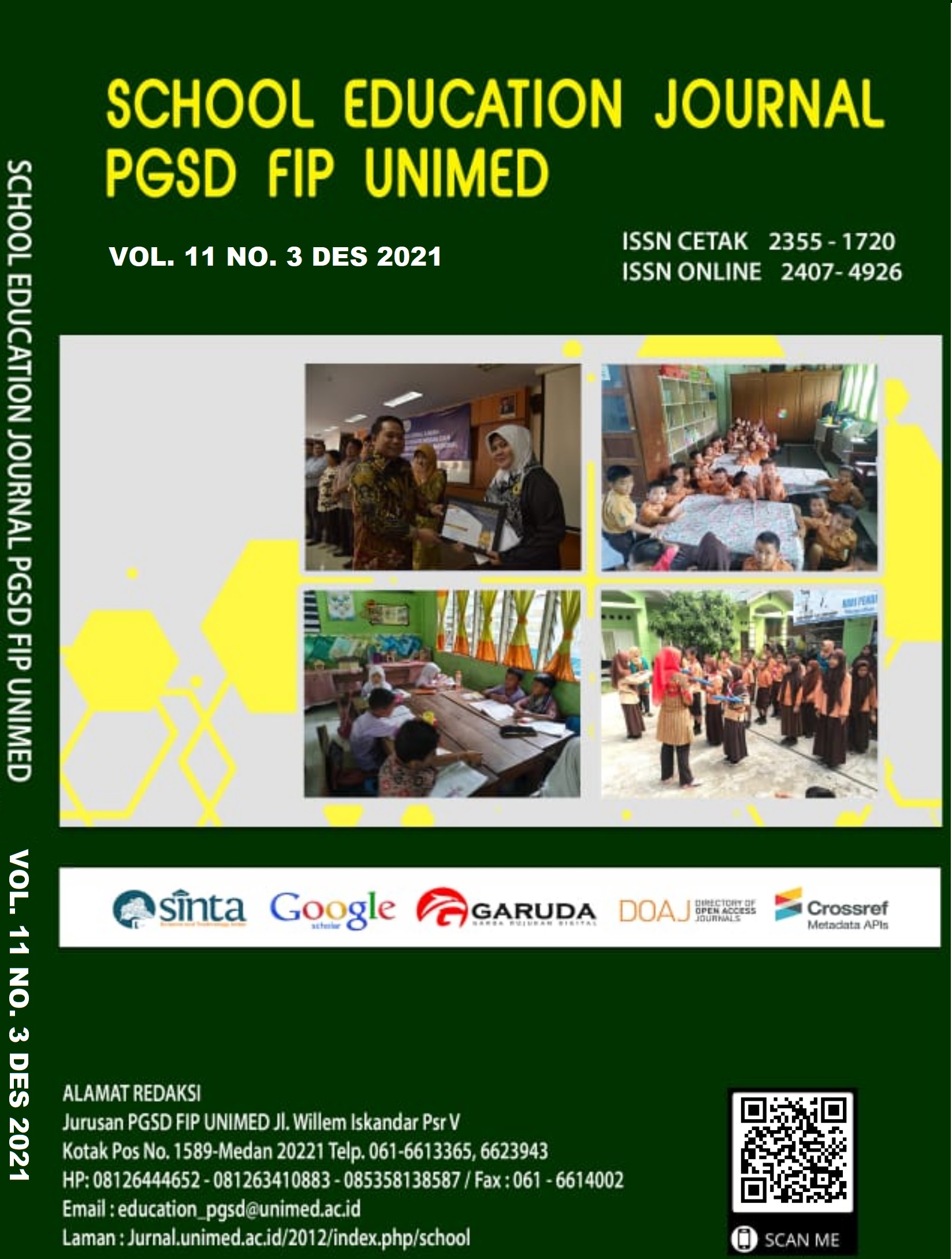PENGARUH PENGGUNAAN GADGET TERHADAP HASIL BELAJAR SISWA PADA MATA PELAJARAN BAHASA INDONESIA KELAS III DI SEKOLAH DASAR MEDAN
DOI:
https://doi.org/10.24114/sejpgsd.v12i3.36176Keywords:
Gadgets, Learning Outcomes, Indonesian.Abstract
The purpose of this study is to ascertain how the use of technology affects the learning outcomes of Class III students at St. Petrus Private Elementary School Medan. This study's participants were all third-graders at Medan's St. Petrus Private Elementary School, which had three classes with 100 students each. Class IIIC was chosen as a sample of 30 students for this study, and the method of sample collection that was used was simple random sampling. A survey-type quantitative approach is utilized in this study. to use the product moment correlation t test to test the hypothesis. According to the findings, the use of gadgets received an average score of 80.17 in the high category, while learning outcomes received an average score of 74 in the lower category. This is supported by the results of the hypothesis t test. If the value of t_count > t_table is 6.809 > 1.697, then Ha is accepted, indicating that third-grade students at St. Petrus Private Elementary School in Medan benefit significantly from the use of technology.References
Banjarnahor, N., Sipayung, R., & Tanjung, D. S. 2020. Hubungan Kecerdasan Emosional Dengan Minat Belajar Siswa Kelas IV SDN 173418 Pollung. School Education Journal PGSD FIP Unimed, 10(4), hal. 306“313, doi: https://doi.org/10.24114/sejpgsd.v10i4.20861.
Firmansyah, N. F. 2019. Peran gadget dalam membentuk pola interaksi sosial Mahasiswa jurusan Pendidikan Ilmu Pengetahuan Sosial di Universitas Islam Negeri Maulana Malik Ibrahim Malang. Malang: Doctoral dissertation, Universitas Islam Negeri Maulana Malik Ibrahim.
Gede Yenny Apriani, D. 2021. Hubungan Penggunaan Gadget Terhadap Prestasi Belajar Siswa Kelas IV Dan V di SD N 3 Candikuning. Jurnal Medika Usada, 4(1), hal. 7“11, doi: https://doi.org/10.54107/medikausada.v4i1.88
Hamdani, M. A. 2010. Strategi Belajar Mengajar. Bandung: Pustaka Setia.
Karwono, M. P. 2017. Belajar dan Pembelajaran Serta Pemanfaatan Sumber Belajar (Pertama). Depok: Rajagrafindo Persada.
Mailani, E. 2015. Penerapan Pembelajaran Yang Menyenangkan. Elementary School Journal PGSD FIP Unimed, 1(1), 8“11.
Mailani, E. 2018. Upaya Meningkatkan Hasil Belajar Matematika pada Materi Pecahan Melalui Permainan Monopoli Pecahan. Jurnal Handayani, 4(1), 1“14.
Mailani, E., Simanihuruk, A., & Manurung, I. F. U. 2019. Pengembangan Media Berbasis Interactive Audio Interaction (IAI) Bagi Mahasiswa PGSD Unimed. Elementary School Journal PGSD FIP Unimed, 9(4), 290“299.
Manurung, I. F. U., Mailani, E., & Simanuhuruk, A. 2020. Penerapan Model Pembelajaran Argument-Driven Inquiry Berbantuan Virtual Laboratory untuk Meningkatkan Kemampuan Literasi Sains Mahasiswa PGSD. Js (Jurnal Sekolah), 4(September), 26“32.
Naibaho, D. E., Sipayung, R., & Tanjung, D. S. 2020. Hubungan Disiplin Belajar Dengan Hasil Belajar Siswa Pada Mata Pelajaran Matematika Kelas V Di SD Negeri 24 Tanjung Bunga. School Education Journal Pgsd Fip Unimed, 10(4), hal. 342“351, doi: https://doi.org/10.24114/sejpgsd.v10i4.20860.
Nainggolan, M., Tanjung, D. S., & Simarmata, E. J. 2021. Pengaruh Model Pembelajaran S AVI terhadap Hasil Belajar Matematika Siswa di Sekolah Dasar. Jurnal Basicedu, 5(4), 2617“2625.
Pardosi, B., Tanjung, D. S., & Anzelina, D. 2020. Pengaruh Model SAVI terhadap Hasil Belajar pada Tema Organ Gerak Hewan dan Manusia di Kelas V SD Negeri 173593 Parsoburan. ESJ (Elementary School Journal), 10(3), 175“184.
Purba, J. M., Sinaga, R., & Tanjung, D. S. 2020. Pengaruh Model Pembelajaran Tipe Kooperatif Tipe Scramble terhadap Hasil Belajar Siswa pada Tema Daerah Tempat Tinggalku Kelas IV. ESJ (Elementary School Journal), 10(4), 216“224.
Rozalia, M. F. 2017. Hubungan Intensitas Pemanfaatan Gadget Dengan Prestasi Belajar Siswa Kelas V Sekolah Dasar. Jurnal Pemikiran Dan Pengembangan Sekolah Dasar (JP2SD), 5(2), 722. https://doi.org/10.22219/jp2sd.vol5.no2.722-731
Sigalingging, R., Tanjung, D. S., & Gaol, R. L. 2021. Pengaruh Model Quantum Teaching terhadap Hasil Belajar Siswa pada Pemebelajaran Tematik Kelas V di Sekolah Dasar. Elementary School Journal PGSD FIP Unimed, 11(3), 263“268.
Sihombing, S., Sipayung, R., & Tanjung, D. S. 2020. Pengaruh Perhatian Orangtua Terhadap Hasil Belajar Siswa Pada Mata Pelajaran Matematika Di Kelas IV Sd Negeri 097350 Parbutaran Simalungun. School Education Journal Pgsd Fip Unimed, 10(4), 314“322, doi: https://doi.org/10.24114/sejpgsd.v10i4.20936.
Sinaga, R., & Tanjung, D. S. 2019. Efektifitas Penggunaan Interactive Educational Multimedia Learning Berbasis Teori Kognitif terhadap Dyslexic Student di Sekolah Dasar. Jurnal Guru Kita, 3(4), 338“341.
Sinurat, R., Tanjung, D. S., Anzelina, D., & Abi, A. R. 2021. Analisis Cara Belajar Siswa Berprestasi Kelas IV di SDN 097376 Sippan. Jurnal Ilmiah Pendidikan Sekolah Dasar, 14(1), 28“37.
Siregar, Z. D., Sinaga, R., & Marianus, S. M. 2022. Pengaruh Bullying terhadap Hasil Belajar Siswa pada Tema Lingkungan Sahabat Kita Kelas V SD Negeri 173416 Pollung. School Education Journal PGSD Fip Unimed, 12(2), 159“167, doi: https://doi.org/10.24114/sejpgsd.v12i2.35635.
Tanjung, D. S. 2016. Meningkatkan Hasil Belajar IPS Siswa dengan Menerapakan Model Pembelajaran Kooperatif Tipe Team Game Tournament (TGT) di Kelas V SDN 200111 Padangsidimpian. Jurnal Juril AMIK MBP, 4(1), 68“79.
Wahyuningsih, A., Widiawati, H., & Zulva, N. 2021. Upaya Bimbingan Belajar Orang Tua Siswa pada Masa Pandemi Covid-19 di Sekolah Dasar. Jurnal Basicedu, 5(6), 5640“56470. https://doi.org/10.31004/basicedu.v5i6.1697
Wahyuningsih, A., Widiawati, H., & Zulva, N. 2021. Upaya Bimbingan Belajar Orang Tua Siswa Pada Masa Pandemi Covid-19 di Sekolah Dasar. Jurnal Basicedu, 5(6), 5640-56470.
Downloads
Published
Issue
Section
License
Authors whose manuscripts are approved are approved as follows:
The publication rights for all journal manuscript materials published/published on the SEJ (School Education Journal) E-Journal site are held by the editorial board with the author's knowledge (moral rights remain with the manuscript authors).
The formal legal requirements for accessing this electronic digital journal article are subject to the terms of the Creative Commons Attribution-ShareAlike (CC BY) license, which means that E-Journal SEJ (School Education Journal) has the right to store, transfer media/format, manage in the form of a database, maintain, and publish articles without asking permission from the author as long as the author's name remains as the copyright owner.
Manuscripts published/published electronically are open access for educational, research, and library purposes.

